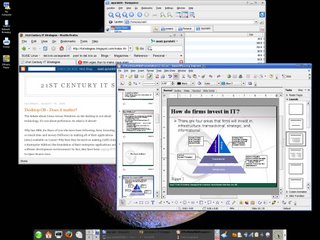The debate about Linux versus Windows on the desktop is not about technology, it's not about preference. So what is it about?
Why has IBM, for those of you who have been following, been investing so much time and money (billions) in making all of their applications [also] available on Linux? Why have they focused on making J2EE (Java 2 Enterprise Edition) the foundation of their enterprise applications and software development environment? In fact, they have been urging SUN to Open Source Java.
I'll address IBM first. In order to succeed, IBM needs a competitive advantage over Microsoft and won't get that as long as their applications only run on Windows. They learned that with OS/2 when Bill Gates lost interest in making it the enterprise Windows and focused on building a new technology (NT) version of Windows instead. The operating system is a commodity but is also essential to run all the enterprise 'stuff' a tech company like IBM sells. Linux allows them an opportunity to develop the hooks or services in Linux they want in order to make it a viable platform for their technologies. Open Source Java would do the same. I bet they can't wait! They have recently announced the availability of Lotus Notes for Linux (now) and Sametime for Linux (soon). Their portal integrates with OpenOffice, as will (I think) QuickPlace 8.
Linux on the desktop gives you choice. Choice not to run (for now) an anti-virus software. Choice to continue running enterprise applications like SAP, Lotus Notes, Sametime, Open Office, Firefox. Other applications are more of a problem but not if you want to move to a Cyrtix-like thin client environment for those.
I'm sorry but Office is not of strategic importance. It's a small piece of the puzzle and should not drive everything else. I have been using / experimenting with Open Office since beta 1.0. It's come a long way and is now what I use almost exclusively. I use it because I don't want my company, long-term, to pay the subscription fees required for MS' products. I use it because it's good enough. Non-IT management has bought in to deploying it to non-critical positions and saving the several hounded dollars per workstation we would otherwise pay. It will be rolled out slowly and carefully making sure negative impacts are mitigated. Our Information Technology group has been using it exclusively for the past 3 months.
I'll be loading a VMWare virtual machine using a free copy of VMWare Player with Windows XP, Outlook 2003, Project 2003 and any other applications I need for the time being, all licensed and paid for. I'll ween myself off them as time goes on. I have just started using SuSE Linux Enterprise Desktop 10 for file access and production/modification of MS Word, Excel, PowerPoint files. Here's what it looks like:

Now, I said it was about choice and it is but I have to also say that I am reducing my choices of what I can install on the desktop. That's where a Cytrix or Windows Terminal Server comes in. We'll see how it goes. Part of the reason it's important to be using desktop Linux and not only Windows is related to the need for platform diversity. I'll be discussing this issue in a later posting.
Update April 2008: OK, the Linux thing was harder than I thought. I'm finding the Mac / OS X combo to be pretty compelling though and have been using it as a complete replacement for the past 11 months. Will blog on it later.
No comments:
Post a Comment